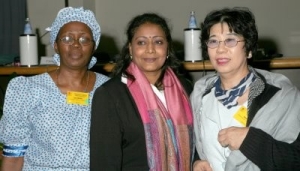by Giorgia Salatiello
Historically, women’s reflections on the feminine condition, and on the human condition in general, began and spread firstly and most widely in the countries of the northern hemisphere (Europe and the United States). Obviously this fact has influenced the application and content of such reflections, to which women have brought their experience and particular sensitivities, as well as the stamp of their socio-cultural contexts.
In some cases there has been an awareness of the particularity of the analyses and proposals, but at times a universal character has been ascribed to the ‘feminine condition’ which is in reality, the condition of some groups of women, often the socio-economically privileged. In recent decades the picture has changed a great deal, and today women from other parts of the world (Latin America, Africa, Asia and Australia) also commit themselves and all their subjectivity to reflecting on themselves and their world, asking not just men but also other women that they be heard.
This situation occurs, not only in the broadest social context, but also in the ecclesial sphere. Some features are the same, but there are others which are peculiar to the completely original reality which is the Church: this is immediately obvious when considering the extensive theological output of women throughout the world.
If we look at the reality of the Church, a question arises which cannot be avoided, as much from the demands of intellectual rigour as for motives linked to the recognition of the equal dignity of all Christians, men and women alike. The question can be concisely formulated as follows: What is it that unites, at the deepest level, all women who recognise themselves as Christians and what, on the other hand, generates differences between them which cannot be ignored without imposing foreign models on some part of them?
It can be seen that this problem also refers to women who do not recognise themselves as having ecclesial membership, but in the Church it has particular features because the links which unite women are not fundamentally social or cultural but are links of communion in the One Body, the Body of Christ.
The first reason for unity among all Christian women is undoubtedly their common faith, nourished by the Word of God and the Sacraments, and lived in the ecclesial community. From the Word comes a well-defined anthropological vision, which offers light on the significance and value of being male or female.
From Sacred Scripture and Tradition, the Magisterium, above all in recent times, has formulated profound anthropological reflections which refer indiscriminately to all women. The number of Christian women who, starting from these reflections, have committed themselves to working on developing proposals on a strictly theological level is quite large.
Thus we come to the second reason for unity: the theoretical elaborations on a philosophical level which women are developing with respect to human nature, to sexual difference and feminine specificity. These are subjects which have universal value and which show a dignity proper to every woman, independent of geographic or socio-cultural particularities. As has been said, these profound reasons for unity must not lead to neglect of the factors which differentiate and, linked to context and the culture to which they belong, make women subject to experiences which are not readily assimilated by all women.
Taking an example from the socio-economic sphere: for women in the northern hemisphere, one of the most urgent problems is finding the balance between domestic chores and work outside the home while, in other predominantly rural locations, this rigid separation does not exist and the commitment of women has greater continuity in sectors where the separation is not so rigid.
What does this diversity of experiences imply in the face of common ecclesial membership?
Firstly, such diversity demands recognition in the Church, giving place to the all the voices of women who experience faith identity in different ways, in daily routines which influences their lives and their reflections on life.
Secondly, the diversity of women must be seen as a reason for true enrichment for women themselves, and for the whole ecclesial community, because it bears witness to the fertility of the Word which can be welcomed without spatio-temporal barriers. In many fields this reciprocal enrichment is active; one just has to think of theological investigation which sees women from various parts of the world as active participants in listening to and reflecting on the faith.
In summary, it should be evident that the dynamic implicit in this encounter of women, so different in terms of their personal experiences, is exactly that found in chapter 12 of the First Letter to the Corinthians, which reminds us that the many gifts are given by the one Spirit for the good of the whole Church.






